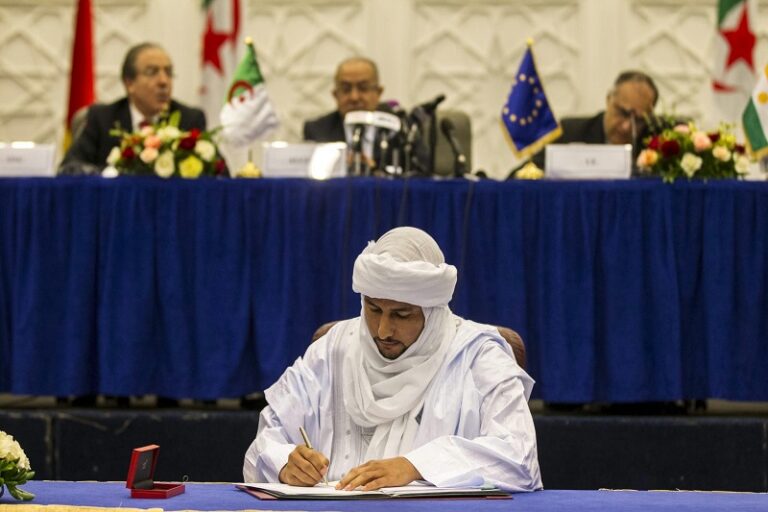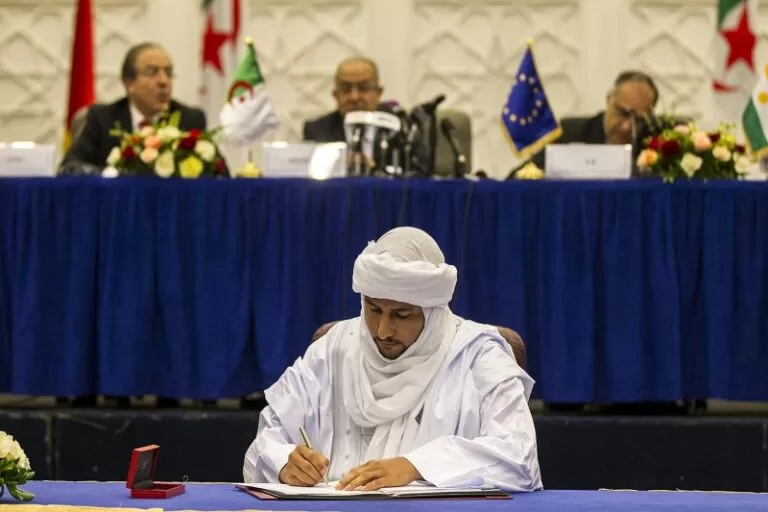

reassurance of the 2015 malian peace accord by algiers and bamako
On Thursday, April 27, Mali and its neighbor Algeria expressed their desire to resurrect a peace accord that was reached in 2015 between the government of Bamako and northern Malian rebels. This deal is more precarious than it has ever been, which raises concerns about a return to violent conflict. Mali and Algeria announced their intention to revive the pact that is commonly referred to as the Algiers Accords in a joint statement that was released on Thursday.
“We have carried out a very precise, very rigorous examination of what is needed to ensure the effective and productive relaunch via a political process protected from short-term turbulence,” Algerian Foreign Minister Ahmed said after talks Wednesday (Apr. 26) with junta leader Colonel Assimi Goita. His visit comes after a delegation of former rebels from Mali traveled to Algeria in February for discussions on how to break the stalemate.
A prominent rebel faction that had previously signed the pact in 2015 has given a scathing response to the possibility of bringing the treaty back on track. “They have to stop sliding further into denial and acknowledge the situation is spiraling out of control,” Ag Mohamed Almou, a spokesman for the Coordination of Azawad Movements (CMA), said in an interview with AFP on Wednesday, April 26.
The peace deal sought to reduce the level of tension in a region that had been rife with bloodshed since 2012, when Tuareg rebels began a rebellion against the country’s central government. Jihadists infiltrated the rebellion and eventually expanded their campaign into the central regions of Mali, Niger, and Burkina Faso. As a result, thousands of people were killed throughout the region, and millions were forced to evacuate their homes.
The accord reached in 2015 brought together the Tuareg rebels and the state in an agreement that gave increased local autonomy and the opportunity to incorporate fighters into a state-run “reconstituted” army that would operate in the region. The agreement also provided for autonomy to be implemented immediately. However, only a portion of the agreement has been carried out so far. In December, the armed groups that had been participating in the deal decided to stop doing so pending the “organization” of a crisis conference with the Malian government “on neutral ground.”
The Support Group for Islam and Muslims (GSIM), which is affiliated with al-Qaeda, government soldiers, and local Tuareg-dominated armed organizations are some of the adversaries that the Islamic State in the Great Sahara (ISGS) group has been gaining momentum against in northern Mali. ISGS is also known as the Islamic State in the Great Sahara.
The U.S.-based driver training company Zutobi analyzed road safety worldwide and found South Africa stays last in driving danger since…
The Basketball Africa League (BAL) returns for its 2025 season with exciting changes and developments. Since 2019 the NBA-linked basketball…
The Somali president supports their military forces to eliminate the threats from Al-Shabaab, ISIS, and Al-Qaeda. The Somali National Army…
UAE President Sheikh Mohamed bin Zayed Al Nahyan held talks with President Faustin Archange Touadéra of the Central African Republic…
African football teams struggle intensely in the World Cup Qualification rounds to earn their place on the international football stage.…
The journey toward the 2026 FIFA World Cup is rapidly intensifying for all African teams, who now hold a historical…
This website uses cookies.